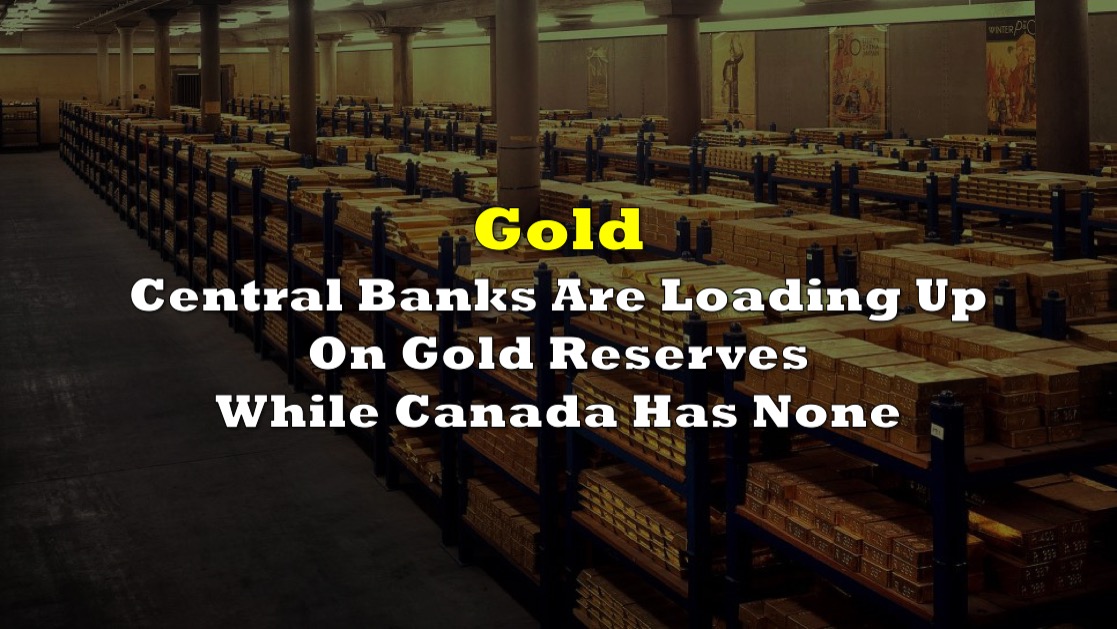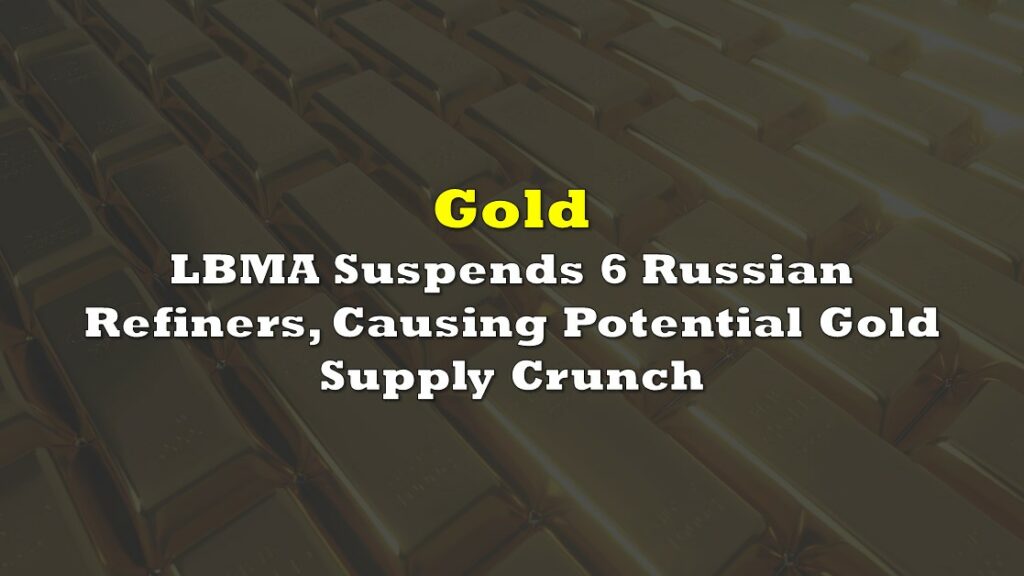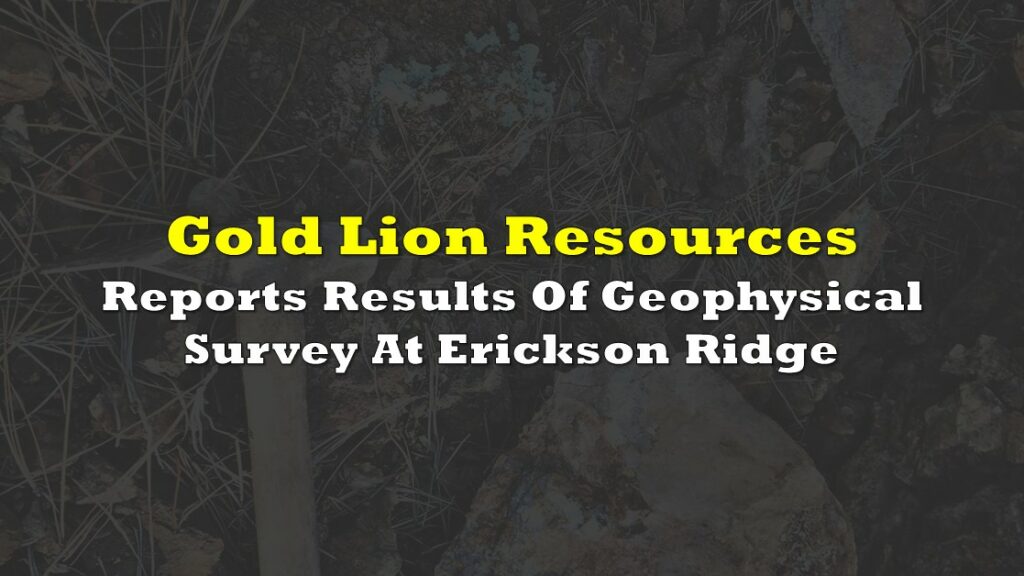Central bankers in charge of trillions of dollars in foreign exchange reserves are stockpiling gold as geopolitical tensions, like the crisis in Ukraine, push them to reconsider their investment strategies.
According to an annual poll of 83 central banks, which oversee a combined $7 trillion in foreign exchange assets, more than two-thirds of respondents believe their peers would raise their gold holdings in 2023.
Bullion becomes more appealing during times of uncertainty, and demand has skyrocketed in the last year. According to the World Gold Council, the amount of gold purchased by central banks increased by 152% year on year in 2022 to 1,136 tonnes.
From the @FT article on
— Mohamed A. El-Erian (@elerianm) April 23, 2023
"Central banks load up on gold in response to rising geopolitical tensions:
Reserve managers’ purchases rose 152 per cent last year and they expect to keep buying."#markets #gold #economy #econtwitter #centralbanks #investing #investors #fintwit pic.twitter.com/YUaKTQg4G9
According to the HSBC Reserve Management Trends Survey published by Central Banking Publications, most reserve managers surveyed ranked geopolitical risk as one of their top concerns, second only to rising inflation.
More than 40% of respondents named it as one of their top risk factors, up from 23% in the previous year’s poll.
A third of those polled had modified or planned to change the assets they purchased as a result of tensions such as Russia’s invasion of Ukraine and deteriorating US-China relations.
Following the invasion, the Western alliance of the United States, United Kingdom, and European Union imposed severe financial penalties on Moscow, including efforts to freeze approximately $300 billion in Russian central bank assets. Because the central bank’s gold reserves were stored in Russia, they were not directly affected by the sanctions.
Top gold buyers
According to World Gold Council data, significant purchases in the last year have been made by central banks in non-Western countries.
In November and December 2022, the People’s Bank of China purchased 62 tonnes of gold, bringing its total bullion reserves beyond 2,000 tonnes for the first time. Turkey’s official gold reserves are expected to increase by 148 tonnes to 542 tonnes by 2022. Last year, the council also identified states in the Middle East and Central Asia as “active buyers” of gold.
World Gold Council chief market strategist John Reade said the sanctions against Russia’s central bank had “caused many non-aligned central banks to reconsider where they should hold their international reserves.”
“Countries have recognised that the gold that Russia holds, because it’s outside of anybody else’s control, is useful in situations where you might not be able to access any other reserves,” he said.
The majority of those polled said that the renminbi would gain a larger percentage of international reserves during the next decade. The dollar accounted for 58% of all central bank reserves in the fourth quarter of last year, according to IMF data. The euro accounted for little more than 20%, while the renminbi accounted for only 2.7%.
The move to shoring up gold reserves again has been gaining popularity among the global economies. Zimbabwe announced last year the plan to start selling gold coins to store value in an attempt to tame rising inflation. The country’s central bank governor John Mangudya said that the gold-based tender can be bought using either local or foreign currency, including US dollars.
The “Mosi-oa-tunya” coin, named after Zimbabwe’s Victoria falls, will contain one troy ounce of gold (around 31 grams) and will be sold by Fidelity Gold Refinery, Aurex, and local banks.
The Zimbabwe government would like to join the BRICS.
— Gold Telegraph ⚡ (@GoldTelegraph_) April 23, 2023
The country will soon introduce a gold-backed digital currency to stabilize its local currency.
Countries in BRICS or looking to join are stockpiling gold.
The dots are starting to connect for all to see.
Fellow African country Ghana is also set to change course in its economic trade with its novel Gold for Oil (G4O) program, essentially attempting to use existing gold reserves in the central bank to support the import of petroleum products.
Canada is not golden
The Bank of Canada began selling its gold reserves in the early 2000’s. Canada is the only G7 country that does not have any official gold holdings.

Canada's Gold Reserves pic.twitter.com/GCOSiMOCZo
— Cañada Record 🪙 (@CanadaRecord) April 24, 2023
Canada may be one of the world’s largest gold-mining countries, but the Canadian government hasn’t been a huge buyer of gold coins or other metals for years. That’s not unexpected given that no country presently utilizes gold to value and underpin its currency.
The country had almost 1,000 tonnes of gold in the 1960s. However, it began gradually selling off its stockpile, and by 2003, the country had only 3.4 tonnes.

In trying to explain it, former Governor of the Bank of Canada David Dodge agreed that Canada should get rid of its gold reserves.
“[The] issue is quite clear, that it costs to hold gold, whereas holding U.S. or Chinese or Euro bonds yields you a return,” said Dodge. “…That was a strong view. And a view that our international monetary system was in a place that was sufficiently robust, that holding this antique instrument of stability called ‘gold’ really didn’t make any sense.”
In the US, three Republican lawmakers introduced a bill to peg again the Federal Reserve note “dollar” to the value of a fixed weight of gold bullion. West Virginia Rep. Alex Mooney, joined by Arizona Reps. Andy Biggs and Paul Gosar, introduced HR 2435 or the “Gold Standard Restoration Act” to define the dollar as a fixed weight of gold.
Gold is currently riding near all-time high prices, breaching the $2,000-mark this month. If the commodity continues the trend, the market value for gold would be far different from where it was in 1971–putting a greater value for the Federal Reserve note “dollar” if the bill passes.
Probably something to (re)consider as the world gears towards a multipolar currency economic order.

Information for this briefing was found via the Financial Times, SmallCapInvestor, Kitco, and the sources mentioned. The author has no securities or affiliations related to this organization. Not a recommendation to buy or sell. Always do additional research and consult a professional before purchasing a security. The author holds no licenses.










One Response
Interesting read! It’s fascinating to see how central banks are diversifying their reserves with gold. Canada’s lack of gold reserves raises questions about its strategy. Perhaps it’s time for Canada to reevaluate and consider the potential benefits of holding gold. Thank you for bringing this topic to light!